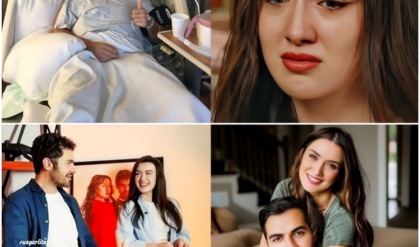It was the Taylor Swift Eras Tour, London, night three. After queuing up outside all day in the scorching heat, my two teenage daughters and I had managed to position ourselves second row from the front. We were a couple of hours into dancing and singing our hearts out when my eldest had a seizure.
While 85,000 Swifties screamed the lyrics they know by heart, the way most people know their loved ones’ phone numbers, Sophia – who had told me moments before that she didn’t feel well – was on the wet, sticky plastic flooring of Wembley Stadium.
Sophia, who’s 19, is epileptic. It isn’t photo-sensitive and she had been given the medical all-clear to attend this concert – the most epic night of her life – but I still immediately felt stupid for bringing her and her younger sister Ellie (who’s only 14) here; for putting us in this vulnerable position.
The medics soon arrived. I was about to administer Sophia’s emergency medication when one of them attempted to lift her onto the shaky, turquoise wheelchair he arrived with. This is when having a child with a disability as unpredictable as epilepsy really tests your abilities to function under pressure. Even there, surrounded by all these screaming strangers, with my daughter’s idol just metres away from us, I had to retain the awareness and communication skills to be able to question the attending medical professionals.
I told him we mustn’t move her while she was seizing. But he was impatient, given we were surrounded by thousands of people, so I got the medication into her there and then and – moments after her body began to soften and relax – he heaved her up onto the chair. The crowd behind us parted like a slick piece of choreography and I was told to walk in front, holding my daughter’s hand, while the wheelchair clipped the back of my legs like an aggressive dog. There was no time to look back and I could only wonder if my other daughter and the (adult) friend we’d travelled with were keeping up behind us.

Sophia was treated at a hospital in London (Amelia Loulli)
I was so sad to be leaving the concert early – mostly because I knew my girls would be devastated. I knew what this night had meant to them and to me – emotionally, financially. It’d taken an awful lot to be there. We’d driven five hours from the north of England, stayed in a hotel overnight, then queued up in front of the stadium for eight hours in the blazing sunshine to get prime position in front of the barriers. We didn’t even get to see the unforgettable moment Travis Kelce came out to join her on stage.
People might say it’s only a concert, but to my girls it was a moment to be joyful after all the challenges we’ve navigated over the past year of chronic illnesses. It was supposed to be a night of songs and sequins and sparkles and friendship bracelets and joy. And, at least for the start of it, it was a night of pure elation and we were a happy part of the Swiftie family. Until it wasn’t.
Suddenly, we were being sped round to the medical centre at the back of the stadium then bundled off to hospital. We were told by medics that only one person could travel with Sophia in the ambulance, and the others would have to make their own way there – without a car; while 100,000 people were beginning to exit the stadium. In the end, they offered to point my friend to the best place to get a cab, which turned out to be an area where all roads were shut. They had to walk half an hour to get a Tube, shaken and confused.
A few hours later, exhausted and heartbroken and in some random London hospital, I could only think – how did we get here? And how is this fair?
When we booked the tickets a year ago my daughter hadn’t been diagnosed as epileptic. I opted for the only tickets available to us in the pure stress of the rapid Swift lottery – four VIP “Ready For It” package tickets, which cost enough to give me heart palpitations. But it felt important and precious to us as a family – as a single parent raising teenagers – so I made plans to pay the tickets off and clicked “purchase”.

Amelia and her daughters were two rows from the front when Sophia had a seizure (Amelia Loulli)
By the time my daughter received her epilepsy diagnosis, the disabled access tickets were all sold out, so we were left with a dilemma. To go or not to go? This is a predicament less able-bodied people will likely know well. To miss out or not to miss out? To tear her dreams apart or risk it? According to my daughter’s doctor, there were no medical grounds for her not to attend the concert – her medication was in place and the truth is, epilepsy is like other disabilities: something you can only learn to navigate.
We did our best to plan around all eventualities and, after a long day of queuing, we made it into the arena. It was immediately clear what we were in for: we were not allowed to take any water in with us and in order to get a decent view, we would have to stay in the places at the front we had so sorely earned, relying on the small quantities of water being given out by staff and avoiding the toilets for the next six hours. Competition to take our spot was aggressive and we would be very unlikely to get back to our place – and to each other – once the concert began.
I was worried for my daughter, but she was feeling well, so I kept my fingers crossed. I know some people will say we didn’t have to get a good view from the front. They might berate us for queuing for so long in the summer heat. But shouldn’t my daughter also be able to enjoy a good view at a concert? Shouldn’t people whose bodies behave differently also be able to be a part of iconic experiences that matter to them?
When she went down, I felt all the hopes she and her younger sister had carried down from Cumbria to London go with her. They had been looking forward to experiencing the wristband lights and fireworks they had seen all over TikTok. They had detailed plans to collect some confetti from the closing number in order to make a memory box. They had believed for a while that we could exist among all those people, enjoying something so special – that we could get away with it without the epilepsy spoiling everything.
Ableism in society is rife; accessibility is about more than ramps and audio support technologies. I knew it when my 17-year-old son, who lives with Autism Spectrum Disorder (ASD), decided a few weeks before the big night that he wouldn’t be joining us at all. We were disappointed but I understood; to expect him to queue for that long – to stand in a confined place with 85,000 people when he struggles some days to leave his bedroom – would be expecting too much. But I saw it to its full extent when with my daughter, right in front of the biggest star on the planet.
I wouldn’t want to be Taylor Swift – coping with that level of fame and expectation must be tricky indeed. She can’t possibly please everyone. But maybe it’s time the most powerful influencers began to look at how ableist the culture we take for granted really is? Maybe it’s time to notice who isn’t at these types of concerts – the fans who can’t endure the demands of such an extreme endurance challenge.
Do people like my daughter not deserve to be at the barrier, experiencing “Shake it Off” and “Fearless” live, like the rest of us?
Of course, we are living with challenges other people are not. It’s nobody’s fault. But there has to be a way to be more inclusive.
I don’t have answers for how to make this better – I wish I did, for my daughter’s sake. But when I think about the power and resources of a groundbreaking artist like Taylor Swift – who just this year attained billionaire status for the first time – I can’t help but think that it must be possible to make things easier for families like mine.

